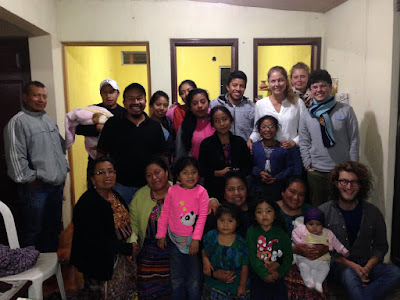Log 10: Kaqchikel and Tz'utujiil Elicitation
Gesoel and I have had the pleasure to work with several
speakers of Kaqchikel and Tz’utujiil for our project exploring the distribution
of /wi/ , which has been described as a post-verbal focus particle in Kaqchikel.
We first interviewed Doña Toya in Tecpán. Doña Toya hosted
Emma for two weeks, and will be welcoming her back to her home after our Patzún
adventure. Doña Toya is a very enthusiastic person who loves to share her
knowledge of Kaqchikel; to summarize some of our findings for her dialect, Doña
Toya rejected the /wi/ particle in many of the environments in which it has
been reported to be obligatory in the literature—for instance, we expected /wi/
to occur obligatorily after the verb upon the extraction of a
locative, but she rejected it outright:
(1) X-Ø-tzopin Lolmaay chwa jay.
COM-B3s-jumo Lolmaay backyard
'Lolmaay jumped in the yard.'
(1') Akuchi’ x-Ø-tzopin (*wi) ri Lolmaay?
where
COM-B3s-jump WI DET Lolmaay
‘Where did Lolmaay jump?’
Doña Toya
was also kind enough to share with Gesoel and I some of her family history—for instance,
she told us about her brother, who always encouraged everyone in her family to
speak Kaqchikel, which prompted Doña Toya to teach the language to her daughter
Odi and her granddaughters. While I will not delve into the details of Doña Toya's family history, it was a
reminder of how aware we should be as fieldworkers of Guatemala’s recent
history and its ongoing impact on the life of the Mayan communities (for an
excellent book on the worst years of the war, I recommend “Terror in the Land
of the Holy Spirit” by Virginia Garrard-Burnett).
 |
| Gesoel with Doña Toya and her daughter Odi |
After our
arrival in Patzún, Gesoel and I have worked with speakers from our host
families. I’ve been interviewing Doña Gilda, who is my host mom Doña
Esperanza’s daughter. She is also a very enthusiastic speaker and a pleasure to
work with. In contrast with Doña Toya, Doña Gilda considers the /wi/ particle
optional; again, unlike what is reported in the literature:
(2) Ankuchi’
x-Ø-tzopin (wi) ri a Lu?
where
COM-B3s-jump WI DET CLF
Pedro
‘Where did Pedro jump?’
 |
| Chris and I with our (huge) host family; Doña Gilda is holding baby Ximena |
Finally, we
were lucky to find a Tz’utujiil speaker right here in Patzún! Tz’utujiil is a K’ichean
language closely related to Kaqchikel which is spoken primarily in San Juan, San
Pedro and Santiago, around Lake Atitlán, though there are speakers as far as
Chicacao in the state of Suchitepéquez. Pedro had heard that there was a Tz’utujiil
speaker somewhere in the 4ta Avenida, so on the 20th we ventured and
asked around, finally falling upon a pink house where Doña Rosario lives and
works. Doña Rosario is a Tz’utujil speaker from Santiago Atitlán who lives in
Patzún with her husband and children—she cooks and sells patines every Friday (a
Sololá dish made out of spicy tomato sauce and a variety of possible meats;
shrimp, fish, chicken, or cecina (beef)).
For Doña Rosario, a /wa/ particle is obligatory upon extraction of adjuncts:
(3) Bani’tz’ra’
x-Ø-pa’j=*(wa) Axwan?
where COM-B3s-fall=WA Juan
‘Where did Juan fall?’
So while we are
well on our way towards documenting (and analyzing) the distribution of the /wi/ and
/wa/ particle in Kaqchikel and Tz'utujiil, there's lots more work to be done!
 |
| Working with Doña Rosario; Paulina (who is working on Tz'utujiil phonology) took the pic |
Ps. I call the language Tz'utujiil (with a long <i>) following García Ixmatá (1997).
Comments
Post a Comment